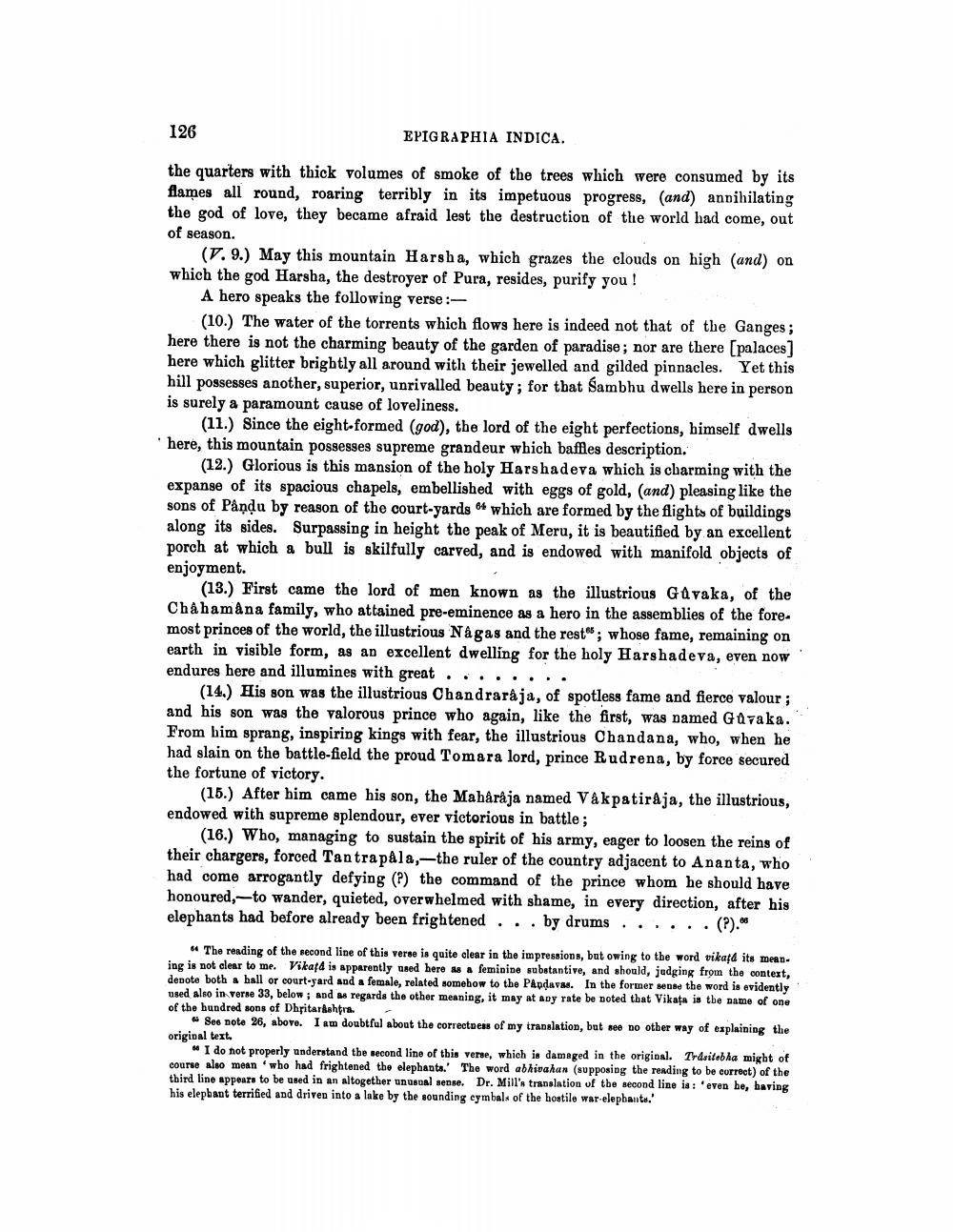________________
126
EPIGRAPHIA INDICA.
the quarters with thick volumes of smoke of the trees which were consumed by its flames all round, roaring terribly in its impetuous progress, (and) annihilating the god of love, they became afraid lest the destruction of the world had come, out of season.
(V. 9.) May this mountain Harsha, which grazes the clouds on high (and) on which the god Harsha, the destroyer of Pura, resides, purify you !
A hero speaks the following verse :
(10.) The water of the torrents which flows here is indeed not that of the Ganges; here there is not the charming beauty of the garden of paradise; nor are there (palaces ] here which glitter brightly all around with their jewelled and gilded pinnacles. Yet this hill possesses another, superior, unrivalled beauty; for that Sambhu dwells here in person is surely a paramount cause of loveliness.
(11.) Since the eight-formed (god), the lord of the eight perfections, himself dwells here, this mountain possesses supreme grandeur which baffles description.
(12.) Glorious is this mansion of the holy Harshadeva which is charming with the expanse of its spacious chapels, embellished with eggs of gold, (and) pleasing like the sons of Påņdu by reason of the court-yards 6+ which are formed by the flights of buildings along its sides. Surpassing in height the peak of Meru, it is beautified by an excellent porch at which a bullis skilfully carved, and is endowed with manifold objects of
enjoyment.
(13.) First came the lord of men known as the illustrious Gavaka, of the Chahamana family, who attained pre-eminence as a hero in the assemblies of the fore. most princes of the world, the illustrious Någas and the rest; whose fame, remaining on earth in visible form, as an excellent dwelling for the holy Harshadeva, even now endures here and illumines with great ........
(14.) His son was the illustrious Chandraraja, of spotless fame and fierce valour; and his son was the valorous prince who again, like the first, was named Gavaka. From him sprang, inspiring kings with fear, the illustrious Chandana, who, when he had slain on the battle-field the proud Tomara lord, prince Rudrena, by force secured the fortune of victory.
(15.) After bim came his son, the Maharaja named Vakpatiraja, the illustrious, endowed with supreme splendour, ever victorious in battle;
(16.) Who, managing to sustain the spirit of his army, eager to loosen the reins of their chargers, forced Tantrapala,- the ruler of the country adjacent to Ananta, who had come arrogantly defying () the command of the prince whom he should have honoured, -to wander, quieted, overwhelmed with shame, in every direction, after his elephants had before already been frightened... by drums ...... (?).
# The reading of the second line of this verse is quite clear in the impressions, but owing to the word vikard its mean. ing is not clear to me. Vikațd is apparently used here as a feminine substantive, and should, judging from the context, depote both a ball or court-yard and a female, related somehow to the Papdavas. In the former sense the word is evidently used also in verse 33, below; and as regards the other meaning, it may at any rate be noted that Vikata is the name of one of the hundred sons of Dhritarashtra
Seo note 26, above. I am doubtful about the correctness of my translation, but see no other way of explaining the original text.
"I do not properly understand the second line of this verse, which is damaged in the original. Trdsitebha might of course also mean who had frightened the elephants. The word abhivahan (supposing the reading to be correct) of the tbird line appears to be used in an altogether unusual sense. Dr. Mill's translation of the second line is : 'even be, having his elephant terrified and driven into a lake by the sounding cymbals of the hostile war elephants.




